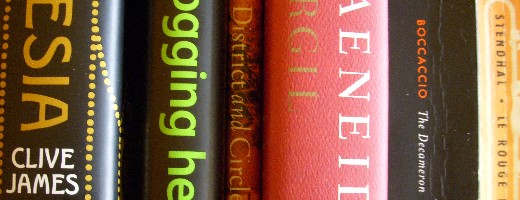Morning Read
Although I cannot wait to be done with Blogging Heroes, there’s no doubt that it has prodded me to “purpose” The Daily Blague. What is my blog about, in one sentence or less? I’ve been squirming for more than a month now, trying to answer this question. Last week, I began to understand. The Daily Blague is a blog about being a reader. Not “about reading,” but “about being a reader.” There’s a difference. And one thing that The Daily Blague most emphatically is not: “a blog about books.”
¶ The Decameron, V, iii: Getting there is no fun at all. If there is a story here, it has been lost in an adventurous itinerary. Two lovers elope from Rome but are parted after making a wrong turn and running into some brigands. He spends the night in a tree, while his horse (una compagnia ed un sostegno delle sue fatiche) is attacked and devoured by wolves; she beds down with a poor old couple in their cottage and, in the morning, evades capture at the hands of yet more brigands by hiding in a haystack. The lovers meet at a nearby castle owned by a friend to both their families, and that’s pretty much that. After lecturing the young man on going against the wishes of his kinsman (his lady-love is not patrician), the chatelaine says to herself, “Why am I knocking myself out here?” (In che m’affatico io?) and not only arranges for the nuptials but makes peace with the kinsmen. The story was where?
¶ Not very receptive to verse today, possibly because of a glass or two too many of wine last night, celebrating Mlle Cotillard’s Oscar win. Also, why is the WiFi reception of the laptop even screwier than it used to be? I shut off the machine but remain too distracted by this issue to attend to Virgil, Heaney & Co.
But I do pause to look up the word “sally.” From “Moyulla,” in District and Circle:
In those days she flowed
black-lick and quick
Under the sallies,
the coldness off herlike the coldness off you —
And, later,
I saw it all
and loved it at the time —blettings, beestings,
creamery spillage
on her cleanly, comely
sally trees and alders.
The dictionaries are no help, not even the OED. (“Bletting,” it seems, means the ripening of fruit.)
¶ Clive James on Sainte-Beuve. A snapshot of the reader’s life:
But in literature there is, or ought to be, such a thing as a right of precedence, and the chronological facts say that Sainte-Beuve sounded like Proust before Proust did. At one stage I read all the way through [Sainte-Beuve’s] collected Causeries de lundi columns in a bunch of disintegrating paperbacks I bought from a bouquiniste on the Left Bank. With torn and faded yellow wrappers thinner than their pages, the books were sadly tattered little bundles that fell open anywhere and eventually fell apart. It was one of the ways I learned French: a lundi a day, underline every word you don’t know, keep going for as long as you get the sense, look up the hard words afterwards. Later on I replaced those tatty collections of Sainte-Beuve’s weekly output with a glistening Pléiade set, and although I never took the Pléiade volumes down from the shelf with the same alacrity, they had their use, principally for checking up on just how completely the star critic has missed the point of most of the great writers of his time.
It’s all there — my entire life, or at least the hours that I have spent alone and out of the kitchen, in in that passage. Mr James has turned his reading to far better account, of course, but I share his aspirations if not his industriousness. The great sadness of Pléiade editions generally is that, by the time one can afford them, one is no longer the hungry youth who couldn’t care less about books as things. Mr James notes that he has acquired the three Pléiade volumes of Sainte-Beuve’s Histoire de Port-Royal, “just in case I ever wanted to get on top of whatever he had to say about Jansenism. It hasn’t happened yet, but might.” Ah.
¶ Monstrously long chapter in Le rouge et le noir, wrapping up Book I with a very inartistic jumble. We begin with Abbé Pirard’s persuading M de La Mole to hire Julien as a secretary, but are soon playing Nozze di Figaro as Julien scrambles up a ladder to the bedchamber of Mme de Rênal, later to be shot at as he makes his escape after a bumpy night of love.
¶ Today’s Blogging hero: Philipp Lenssen, of Google Blogoscoped. I am not quite sure what this blog is about, but it is apparently very popular. Rather more interesting is the blog that Mr Lenssen published in 2003, in which he updated, as a blog written today, Goethe’s The Sorrows of Young Werther. Now that would be the way to play with Les liaisons dangereuses.

